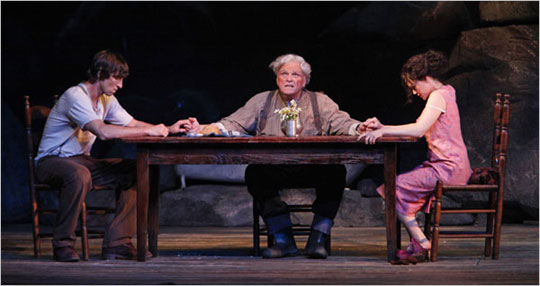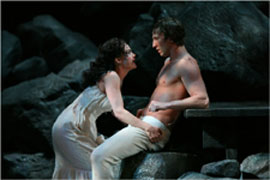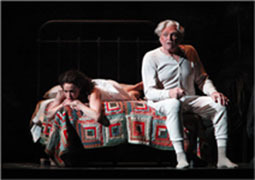|
New York Times, April
28, 2009
A High Freudian Love
Triangle With Three Sharp Points
By CHARLES ISHERWOOD
|
 |
|
Pablo Schreiber, left, and Brian Dennehy play father and
son, and Carla Gugino the father’s new wife, in Robert
Falls’s production of O’Neill’s 1924 play "Desire Under the
Elms," at the St. James Theater. Sara
Krulwich/The New York Times |
A lust for sex and a lust for
real estate are familiar passions to many, notwithstanding the
plummeting co-op market and those libido-dampening Dow numbers. But
these primal drives take on an eerie, entrancing strangeness in the
gutsy revival of Eugene O’Neill’s “Desire Under the Elms” that
opened Monday night at the St. James Theater. Portraying a
stepmother and stepson doomed to enact a feverish, erotic dance that
will ultimately destroy them, Carla Gugino and Pablo Schreiber fight
like tigers in a cage over a legacy of land, even as their bodies
cleave violently together, aflame with urgent need.
First seen at the Goodman Theater in Chicago, where it was the
centerpiece of a winter festival devoted to O’Neill, this visually
spectacular production wraps his powerful but problematic 1924 play
in a big bear hug, making no attempt to throw a blanket of soft
naturalism over its sometimes glaring flaws. On the contrary, the
director Robert Falls, who led the last Broadway revival of “Long
Day’s Journey Into Night,” honors O’Neill’s ambition to transplant
Greek tragedy to American soil by mounting the play on an epic
scale, even adding a few expressionist touches of his own. (A
recording by Bob Dylan is unexpectedly heard.)
Do not bother to scan the sky-high rock piles of Walt Spangler’s set
for glimpses of the titular trees, however. Mr. Falls has eliminated
them, allowing the close, coddling maternal symbolism they are meant
to provide to go by the wayside. It is not much missed. “Desire
Under the Elms” dates from what might be called O’Neill’s High
Freudian phase, which would also include the trilogy “Mourning
Becomes Electra” (a modern-day retelling of Aeschylus’ “Oresteia”)
and “Strange Interlude,” a long evening’s journey into the tortured
heart of a neurotic named Nina.
Although the plot of “Desire” is drawn directly from Euripides’ “Hippolytus,”
and O’Neill played down Freud’s influence, the Oedipal instinct is
front and center in the psyche of the young Eben Cabot (Mr.
Schreiber), who still mourns his mother’s death and bitterly blames
his father, Ephraim (Brian Dennehy), for working her as hard as he
works himself and his three sons on their New England farm. (Boris
McGiver and Daniel Stewart Sherman play Eben’s brothers, loutish
brutes who abandon the farm to pursue gold rush dreams in
California.)
When Ephraim brings home a blushing rose of a new bride, Abbie (Ms.
Gugino), Eben is enraged at the potential loss of his inheritance,
until the hypnotic allure of his stepmother begins tearing down his
emotional defenses.
The process is enacted with captivating magnetism by these two
exciting actors. Rarely has sexual passion been depicted with such
tense, animalistic ferocity on a Broadway stage. After a somewhat
ponderous start, during which we have a little too much time to
marinate in the stagy, countrified dialect O’Neill employs, the
temperature rockets upward when Abbie and Eben meet and exchange a
long glare in the farmhouse kitchen. Mr. Schreiber, with a backwoods
face and beefcake body, radiates a febrile, simmering fury in a
performance of taut intensity. From beneath a dark fringe of hair,
Eben’s eyes glow with compulsion, recognizing in the
delicate-seeming Abbie a formidable competitor, and scorning her as
a “harlot” tarnishing the memory of his sacred mother.
|
 |
 |
|
Carla Gugino and Pablo Schreiber in "Desire
Under the Elms." Sara Krulwich/The
New York Times
|
Carla Gugino and Brian Dennehy in "Desire Under the Elms."
Sara Krulwich/The New York Times |
Abbie’s approach is more
accommodating. She has learned the harsh compromises life demands
and made a cruel bargain by marrying the flinty, much older Ephraim.
In Eben, her rival for the home she has finally found, she also
instinctively sees a source of sexual and emotional consolation.
Embracing the florid extremes of the role with a thrilling bravado,
Ms. Gugino makes us see with painful clarity how these two
conflicting desires corrode Abbie’s psyche so completely that they
are finally blended into one consuming need to retain Eben’s love at
all cost. It is a brave, luminous, ultimately haunting performance.
As the ornery Ephraim, proud of his independence but secretly
longing for understanding, Mr. Dennehy has grown into the role since
the Chicago run. His craggy face resembles a worn rock in which time
and experience have etched hard lines, but Mr. Dennehy didn’t before
seem to possess in his bones the grim, flinty spirit of the man. He
does now, at least in fierce flashes. During the scene in which
Ephraim exults in his new fatherhood—taunting Eben with the loss of
his inheritance, unaware that his son has fathered Abbie’s child—Mr.
Dennehy exudes the hungry malice of a jackal tearing away at a
rodent.
“God’s hard, not easy,” Ephraim observes with a measure of
satisfaction. The same could be said for many a second-tier O’Neill
play. This great American playwright never shied from a dramatic
challenge, even if he sensed that his talents might not be equal to
the demands placed on them. His weaknesses are extravagantly
apparent in “Desire Under the Elms.” The writing can be repetitive
and painfully overexplicit, the attempts at poetry blunt and
strained. Rather than achieving the grand synthesis of tragedy and
humble domestic drama that O’Neill envisioned, the play sometimes
comes across as melodrama overblown to mythic proportions.
And yet O’Neill wrote with a deep understanding of the destructive
clash between the ferocity of human needs and the hard exigencies of
life, and held a deep belief in the power of drama to imbue human
experience—even the most sad or sordid—with a moving grandeur. With
Ms. Gugino, Mr. Schreiber and Mr. Dennehy giving performances of
unflagging commitment and exposed feeling, the production manages to
transcend the play’s flaws to transmit the penetrating truth of
O’Neill’s underlying vision, of the ineradicable human need to
possess and be possessed.
|

